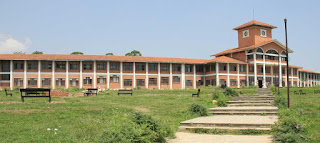
Tribhuvan University (TU) is a public university in Kirtipur, Kathmandu, Nepal. Established in 1959, TU is the oldest of the five universities in Nepal. Enrollment in 2013-2014 was eighth largest in the world.
The university provides undergraduate and graduate education. More than 4,400 courses are offered, of which 500 are for intermediate-level courses (equivalent to higher secondary school), 2,079 are for undergraduate and 2,000 are for postgraduate programs. The university has 85 integral colleges and more than 600 affiliated colleges throughout the country. Since it is government financed, it is less expensive than private universities.
Academics:
TU marked its golden jubilee in the year 2009 organizing various programmes. In the 52nd year of its establishment, the university family remains committed and dedicated to making it a source and center of quality education to set up a culture of learning in the country and to promote the notion of national and global peace and harmony.
Since its inception, the state owned university, has, expanded its programmes in different disciplines. There are five technical institutes and four general faculties. The university offers 115 courses for the technical proficiency certificate level. TU offers 1079 courses at Bachelors level and 1000 courses at Master’s level. It offers Ph.D. degree in different disciplines both at the Technical Institutes and Faculties.
TU ran its programmes only through its constituent campuses prior to 1980.With the increasing number of students willing to acquire higher education; it was not possible for the university to accommodate all the students in the constituent campuses. This situation led to the establishment of colleges in the private sector because the constituent campuses of the university alone could not meet the demand of the nation. From 1979–80, TU started providing affiliation to private colleges to conduct various programmes at different levels. Eight hundred twenty six private colleges spread all over the country have so far received TU affiliations.
In the current academic session (2014-2015) altogether 4,05,341 students have been enrolled at various levels of TU academic Programmes. 1,48,141 (36.55%) students study in its 60 constituent campuses including 38 central departments, while 2,57,200 (63.45%) students study in 1053 affiliated colleges. It clearly reveals that affiliated colleges do have more students than the constituent campuses.
TU has 7841 teaching faculty and 7413 non-teaching staff including the support staff in its constituent campuses. The number of total employees is 15254.
Faculties Of Tribhuwan University:
Faculties and associated Central Departments
There are four Faculties at the University:
- Faculty of Humanities and Social Sciences
- Central Department of Buddhist Studies
- Central Department of Chemistry, TU
- Central Department of Culture
- Central Department of Economics
- Central Department of English
- Central Department of Biotechnology
- Central Department of Fine Arts
- Central Department of Geography
- Central Department of Geology
- Central Department of Hindi
- Central Department of History
- Central Department of Home Science
- Central Department of Journalism and Mass Communication
- Central Department of Library Science
- Central Department of Linguistics
- Central Department of Maithili
- Central Department of Nepali
- Central Department of Nepal Bhasha
- Central Department of Political Science
- Central Department of Population Studies
- Central Department of Psychology
- Central Department of Rural Development
- Central Department of Sanskrit
- Central Department of Sociology
- Central Department of Anthropology
- Faculty of Management
- Central Department of Public Administration
- Central Department of Management
- Faculty of Education
- Central Department of Education
- Faculty of Law
Institutes:
There are five Institutes at the University:
- Institute of Agriculture & Animal Sciences (IAAS), Rampur, Chitwan
- Institute of Medicine
- Institute of Engineering (IOE), Pulchowk, Lalitpur
- Institute of Science & Technology (IOST), Kathmandu
- Institute of Forestry (IOF), Pokhara, Kaski
TU is government financed but still an autonomous organization. The head of the government, the prime minister, is its chancellor.
- Chancellor: Prime Minister of Nepal
- Pro-Chancellor: Minister of Education
- Vice Chancellor: Prof. Dr. Tirtha Raj Khaniya
- Chairman: Prof. Dr. Ishwar Chandra Dutta
- Rector: Prof. Guna Nidhi Nyaupane
- Registrar: Dr. Chandra Mani Poudel

No comments:
Post a Comment